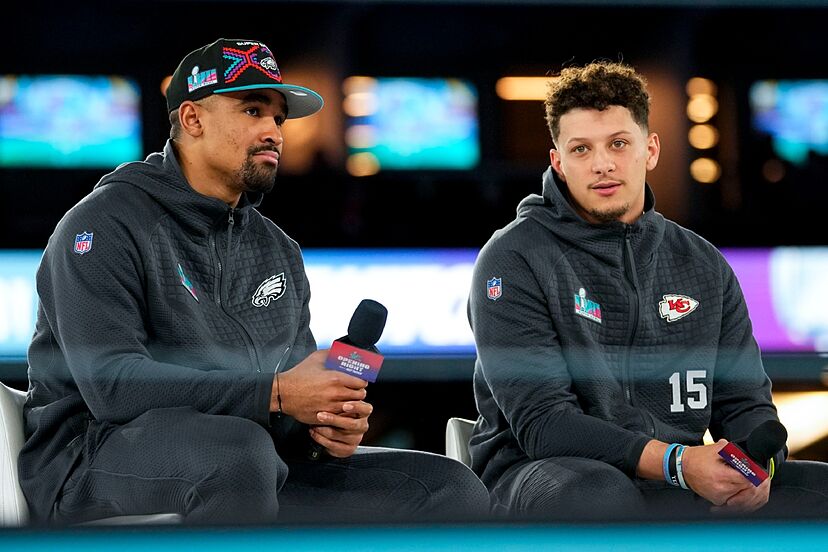The Eagles’ 40-14 victory over the Kansas City Chiefs Sunday night was the culmination of years of hard work in multiple facets. But the most important victory on Super Bowl Sunday was Jalen Hurts’s. His performance in Super Bowl LIX was a much-needed win for the Black quarterback.
Hurts finished the game with 221 passing yards on a 77% completion rate, two passing touchdowns, 72 rushing yards and a rushing touchdown, and he played like the better quarterback all night. Hurts was instrumental to the Eagles’ win, earning Super Bowl MVP.
Hurts represents something special in football, something that many older football fans thought they might never see. Hurts is unapologetically Black, playing the most important position on the field.
He is a Houston, Texas native and a proud member of Omega Psi Phi Fraternity, Incorporated – one of nine revered and historically Black Greek letter organizations. He wears outfits derived from the current streetwear fashion trends, you’ll seldom see him without his trademark hoop earring in one ear, and he went viral earlier this season for wearing a diamond chain that “danced” brighter than any of the most popular rappers’ chains. Jalen Hurts is Black, and he is an NFL quarterback and that matters.
Although the racist de facto restrictions on who is allowed to play quarterback and who is not have been somewhat alleviated, we still live in a period of time when Black quarterbacks are routinely disrespected.
Just days before Hurts masterfully led the Eagles to their second NFL title in franchise history, Baltimore’s Lamar Jackson was a victim of these external limitations.
This season, Jackson led the Ravens to a 12-5 record and an AFC North title. He was sixth in passing yards with 4,172 and second in passing touchdowns with 41 and threw just four interceptions. On the ground, Jackson accumulated 915 yards and tacked on four more touchdowns. It was arguably his best season statistically, surpassing the numbers he posted in 2019 and 2023, his MVP seasons.
Instead of Jackson winning his third career MVP award, recognition many thought he was a lock for, the trophy was given to Buffalo Bills quarterback Josh Allen, who finished the year with 3,731 passing yards, 28 passing touchdowns, 6 interceptions, 531 rushing yards and 12 rushing touchdowns. The Bills also won their division and finished 13-4. Even with Buffalo having the better record, based on the numbers, it wasn’t even a competition. Yet, Allen is still the 2024 MVP, and Jackson went home with nothing.
The way this year’s MVP race played out is exactly why Jalen Hurts’s Super Bowl win is so impactful. Black quarterbacks, it seems no matter what they do, will never be enough. It doesn’t matter how many times they prove their abilities to throw the ball, they will always be looked at as a runner first.
Sunday, Hurts showed it doesn’t matter how the outside world perceives his abilities to quarterback a team on the most elite level, he can do it. A Black man can do it.
In the eyes of most, Super Bowl LIX was always going to be a win for the Black quarterback. It was either Jalen Hurts who was going to win his first Super Bowl or Patrick Mahomes, who would complete his historic three-peat.
But there’s a stark difference between Mahomes and Hurts, one many Black people won’t hesitate to point out. Mahomes, despite the words he says, is not representative of Black quarterbacks’ success in the NFL, at least not anymore.
When Patrick first arrived on the scene, he was celebrated by the Black community. He changed the game, and no matter how much people tried to put him in the box of being a running quarterback, his arm talent just wouldn’t allow him to fit that mold.
But as time went on, Mahomes naturally distanced from the Black community. As a biracial man, he was already significantly fair-skinned in comparison to other Black quarterbacks fighting against stereotypes. Then, he married Brittney Mahomes, a white woman from a small town in Texas, who Mahomes had been with since high school.
As political tensions in the United States heightened, Americans looked to their favorite sports figures to take a stand. Mahomes didn’t, but all it took was a few sly social-media interactions with President Donald Trump’s content by Brittney for fans to reach their own conclusions about her political affiliations and, by association, Mahomes’s.
Patrick Mahomes may not be a Trump supporter, but based on his noted public silence in political matters, he doesn’t have a problem with people thinking he is. For these reasons, Mahomes cannot be the face of Black football. He can’t be the Black quarterback. He’s just a quarterback who happens to be half-Black.
Hurts is different. Coming into the game, he was lauded by fans who appreciated his indifference to Trump’s attendance at the big game.
He’s been himself through every step of his career, from the dreadlock-wearing version he was in college to the modern rendition who sports a low fade with a tight lineup.
Hurts carries his Blackness with him wherever he goes on the field and off it, and as evidenced by his commercial released by Jordan Brand following the game, Hurts has no time for the hate.
Hurts’s win is a win for every young Black quarterback watching and a message that they don’t have to leave behind their blackness to play the game’s most impactful position.


